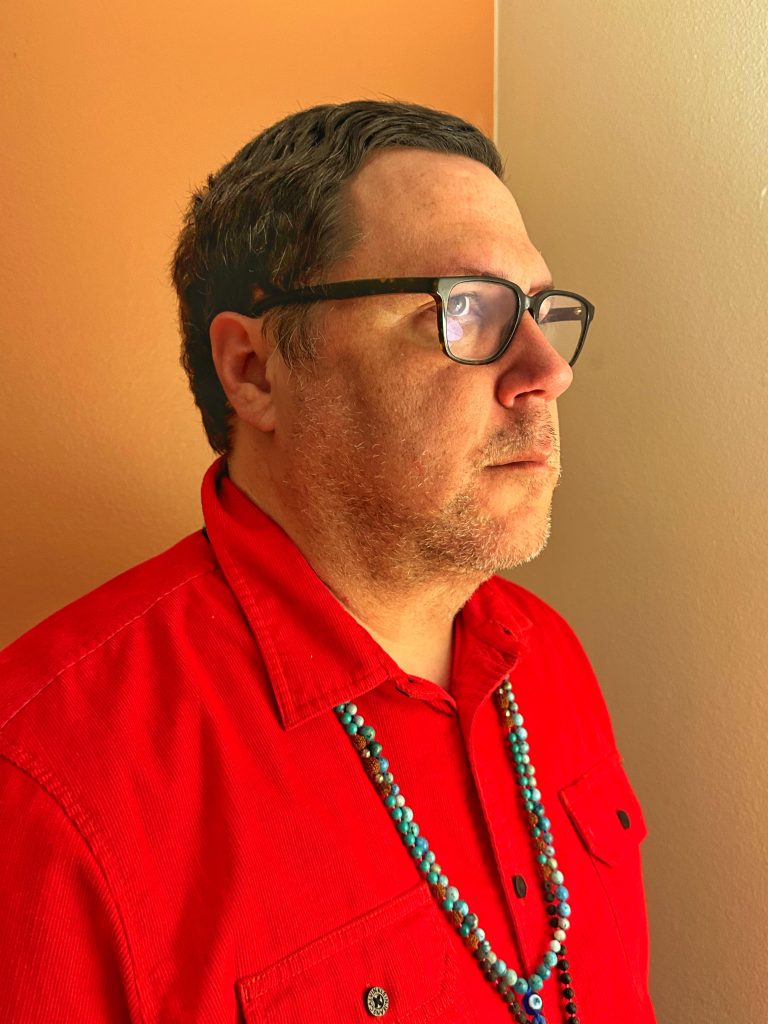
“Play on, there’s no such thing as better days,” Damien Jurado sings on “Roger,” the sweeping wash of a song that opens Reggae Film Star, his 18th full length album and second release from Jurado’s own Maraqopa Records label. But as he enters his 25th year as a recording artist, it’s clear these are, at the least, very good days for Jurado on the creative front. In these 12 songs, which evoke half-recalled dreams and overheard conversations, the cosmic rushes headlong into the autobiographical and specific moments on the clock fade from past to future to scenes set only in the eternal now.
Playing out like a backlot documentary filmed on the location of an unnamed TV or film set—maybe a sitcom taping, or perhaps it’s a low budget science fiction B-movie, or could it be a talk show?—the album is populated by performers awaiting call times, camera operators praying for their shot, and studio audiences rapt with anticipation. The stars here eschew glitz and glamor. Instead, they wander grocery stores and parking lots in the verdant Pacific Northwest and the desert Southwest, looking for payphones and a sense of purpose.
Produced by Jurado with multi-instrumentalist Josh Gordon and recording engineer Alex Bush at Sonikwire studio in Irvine,CA, Jurado’s home away from home and musical headquarters, the record’s compositions are among the most musically rich in his vast discography, encompassing romantic AM gold, ‘60s psychedelia, driving rock & roll, Latin shuffles, and left of the dial ambiance. Strings swell, melodic bass bubbles, and piano sparkles, undergirding Jurado’s unmistakable voice, at once intimately present and ghostly, grounded in the here and now but capable, at any moment, of drifting off into the divinatory. Following threads established by 2021’s The Monster Who Hated Pennsylvania, the album sees Jurado embracing his auteur era, penning vignettes that arrive with little fanfare and depart quicker than you might suspect, only to linger long after they wrap.
Seeking a skeleton key to decipher the action is beside the point—Jurado’s songs are worlds meant to be lived in, not picked apart—but on the beatific single “What Happened To The Class Of ‘65?” the singer imagines himself as both the viewer and the viewed, the eye behind the camera and its subject. This emotional and spiritual transference animates Reggae Film
Star. Like a masterful director, Jurado offers motivation to the listener, staring unblinkingly from the mise-en-scène in your mind. “Look into the camera,” he commands on “The Day Of The Robot,” “One more time with anger/And sadness/I believe you.”
A quarter-century in, Jurado remains gripped by his visions and driven by an unmatched creative drive. Reggae Film Star is one of Damien Jurado’s finest works to date, a stunning new feature from one of indie rock’s most cinematic figures. Here on this sound stage, you are the camera, you are the scene, you are the setting, and you are the viewer. Please try not to blink.
-Jason P. Woodbury

Nick Delffs
Nick Delffs is not a protest singer. He’s not a gospel singer. Still, subversiveness and spirituality permeate Transitional Phase, his long-awaited second solo album. The product of five years of musical and personal growth that coincided with widespread social upheaval and a global pandemic – just as Delffs navigated first-time fatherhood, losing friends, and approaching his 40s; all weaved these songs.
Now Boise-based, Nick Delffs has been a beloved staple of Pacific Northwest music since emerging with his Portland-based band The Shaky Hands in the mid-2000s. It was clear then, as it is now, that he possessed an authentic—maybe ancient—voice. Transitional Phase is some of his finest and most vulnerable work. As the title suggests, it’s an album about opening oneself up to change, refusing the calcification that comes with age, and opting for wholesale transformation instead.
Incidentally, “Transformation” is the title of the album’s opening track. It’s a looping, percussive opener, a dub-inflected signal that Transitional Phase’s themes of change and transfiguration will not be limited to its lyrics. Like much of the new album, it was recorded in early 2020 at co-producer/collaborator Eli Moore’s spacious and strange stripmall studio on Whidbey Island, just outside of Seattle. However, when the sessions were interrupted by the onset of the pandemic, Delffs was forced to continue work back in Boise. He wrote constantly in the early days of the lockdown and entered a secluded vocal booth in his friend Z.V. House’s Boise studio. Delffs would send the resulting tracks to Moore, who often took songs in unexpected new directions. “Eli added a lot,” Delffs says. “He really put himself in it. I’m not sure I’d felt that level of deep collaboration and trust since the Shaky Hands days.” This process continued until Delffs had about three albums worth of material to sort through.
When writing, Delffs spends as much time as possible not listening to music. “That’s really helpful for me,” he says, “because then it becomes this thing where I need music, I need songs—so I have to make them.” Delffs spent as much time thinking about cows—yes, cows, like the John Gnorski-illustrated one on the album’s cover—in the recording process as he did about any particular musical inspirations. Delffs’ recent trip to India, his second, was filled with cow admiration, and he picked up some cow fun-facts along the way. “They just eat grass and somehow milk is created,” he marvels. “Their poo and pee is antiseptic and medicinal!”
Still, the memory of music sneaks into the process, as Delffs found himself thinking about Tom Petty and Talking Heads, two artists he loved in childhood. One can hear echoes of David Byrne on the angular “Power and Position”, which also serves as a spotlight for the unmistakable accompanying vocals from LAKE’s Ashley Eriksson, whose voice has been heard by millions in Cartoon Networks ‘Adventure Time’ credit music. Delffs enlisted more old friends to help flesh out Transitional Phase, including drums from Joe Plummer (The Shins, Modest Mouse, Cold War Kids), Dan Galucki (Wooden Indian Burial Ground) and Graeme Gibson (Michael Nau, Fruit Bats); keys from Luke Wyland (Au, Methods Body); strings and arrangements from composer Peter Broederick (Sharon Van Etten, M. Ward); and bass by Mayhaw Hoons, his old bandmate in The Shaky Hands.
The lush “Brave New World” looks outward, juxtaposing a smooth groove from Galucki and Hoons with heavy themes of social upheaval. The titular phrase, often used ironically, is presented here with utter earnestness, underscored by Broderick’s beautiful string arrangement. It’s one of three songs on Transitional Phase—along with back-to-back closers “A Perfect Storm” and “Egomaniacs”—that slowly transforms into a prayer. The chanted and sung lines might feel like nods to some of Nick’s favorite artists (including Alice Coltrane, George Harrison, Yamuna Devi), but they arrive on the album naturally. Delffs has long been fascinated with Hinduism, and was deeply inspired by his India trip. “Meditating and chanting are such constant parts of my life these days,” Delffs shares. “They came into this album like any other naturally flowing thought.”
“Transitional Phase”, the towering title track at the album’s center, is a perfect marriage of two aesthetics. Delffs brings his vulnerable, misty-eyed self-examination to the collaboration; while Moore and Eriksson bring LAKE’s exacting, literate DIY Yacht funk. The result is transcendently, sonically free, like those particularly melodic moments spent with Peter Gabriel or Kate Bush. “In-between words and dreams, there’s only a line,” Delffs sings in seeming self-interrogation, “And you’ve crossed over it so many times.”
The songs on Transitional Phase don’t just cross that line, they dance on it. If the distance between waking life and dreams was narrow on Delffs’ 2017 solo debut Redesign, it is almost imperceptible here. He sings (and speaks, and occasionally chants) about the changing tides of our shared troubled world and all the mysterious worlds within. He yearns and searches and remembers, and occasionally wishes he could forget. He finds faith and loses it. And when he can’t find that faith again, he admits on “Absence of Love Song” that he’ll wait “on and on and on and on for another chance.” Maybe that’s foolish. Or, as Delffs sings, “Maybe it’s today.”
Nick Delffs’ Transitional Phase is due out July 26th on Mama Bird Recording Co.





